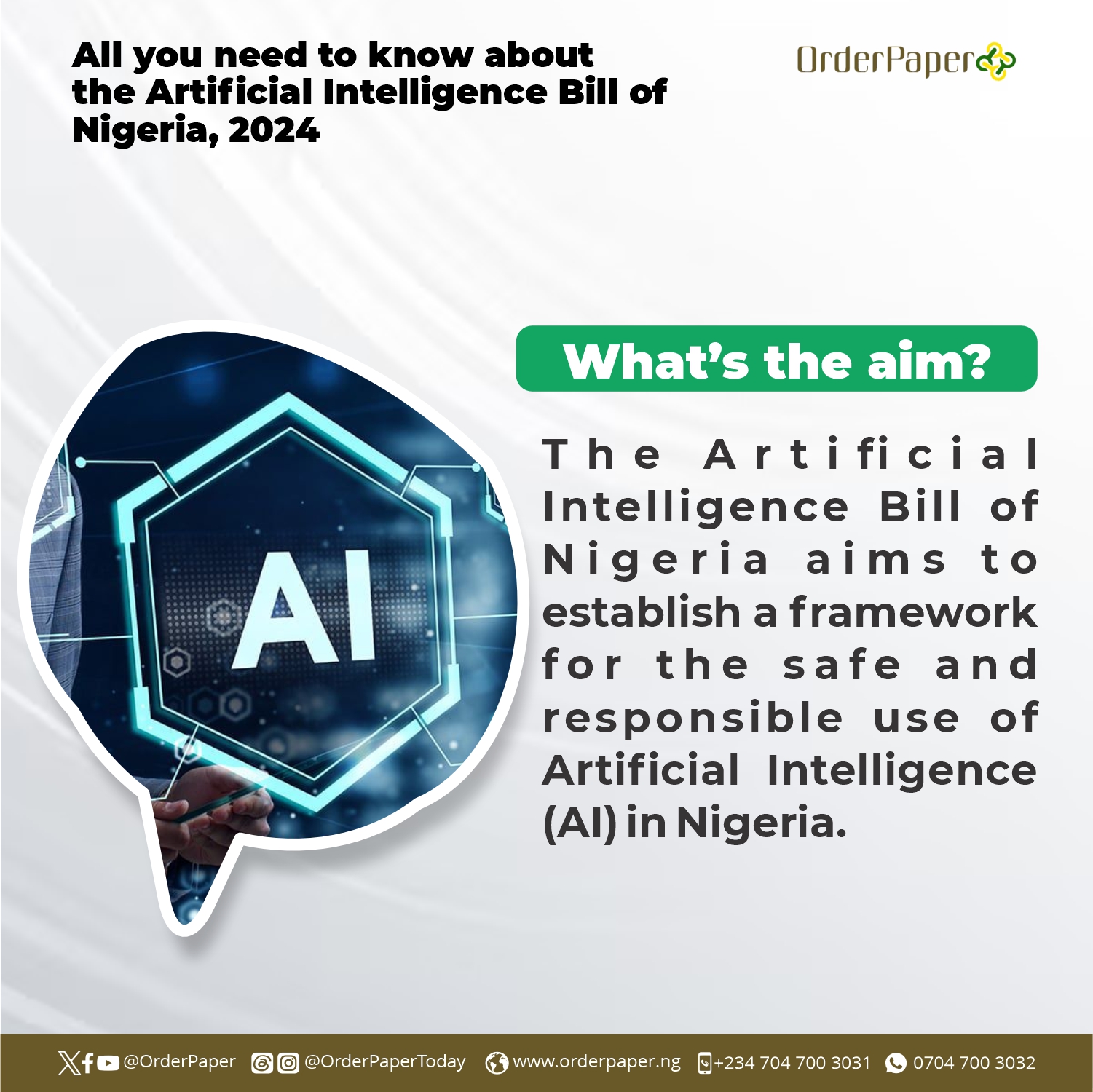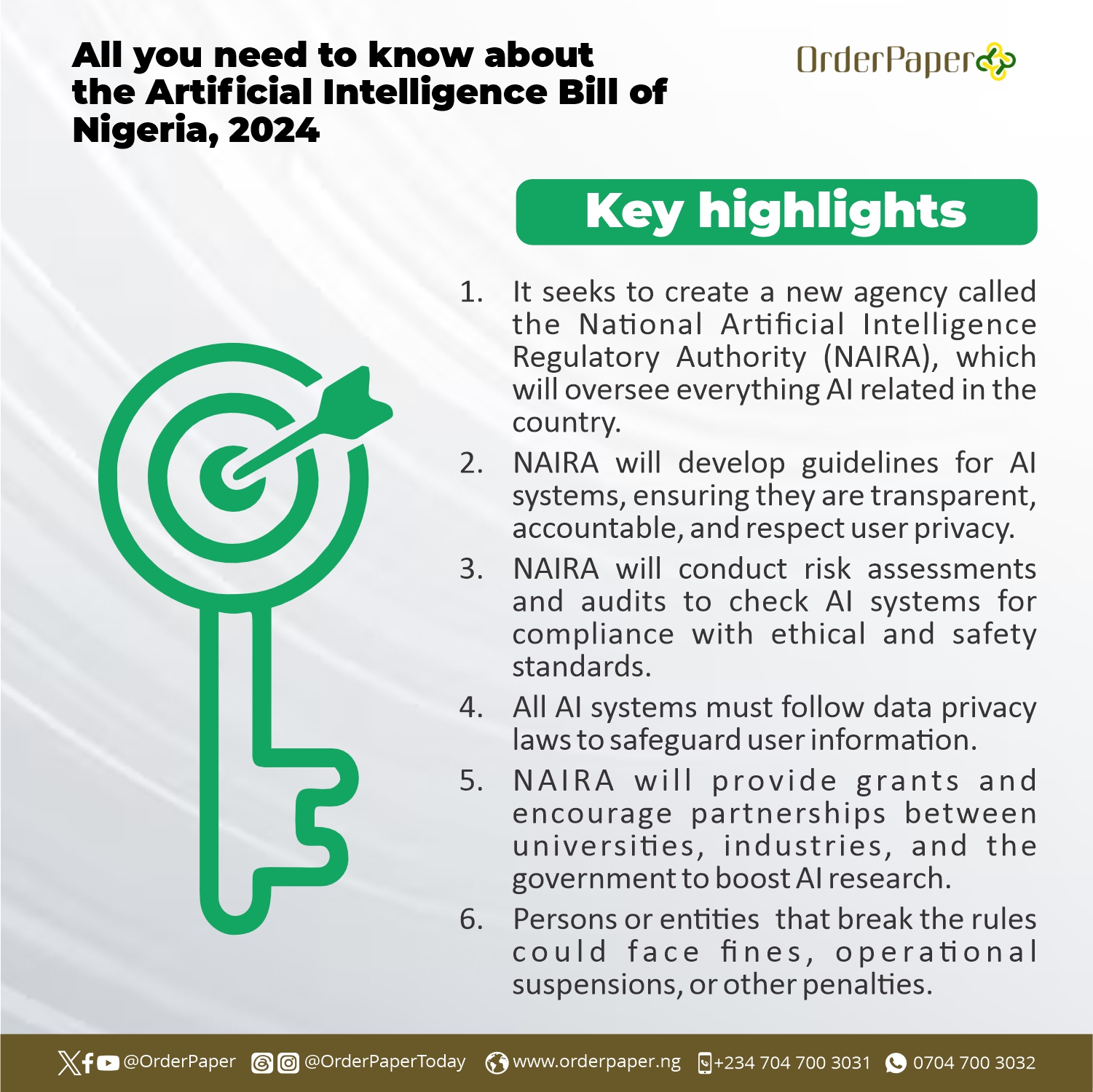The Artificial Intelligence Bill of Nigeria, 2024, marks a critical milestone in the country’s commitment to regulating AI and harnessing its potential for national development.

The 21st century has ushered in an era of technological transformation, with Artificial Intelligence (AI) at the forefront of this revolution. From automating routine tasks to driving innovation in sectors such as healthcare, finance, education, and entertainment, AI is redefining how businesses and governments operate. Its influence has been particularly transformative in the fields of decision-making, data processing, error reduction, and predictive analytics, allowing organisations to improve productivity, efficiency, and overall service delivery.
AI is not a single technology but rather a collection of advanced systems and techniques that enable machines to perform tasks that typically require human intelligence. These include tasks such as learning, problem-solving, reasoning, and even creativity. AI has already become a game-changer in how we live and work, offering benefits ranging from increased efficiency to the ability to innovate at an unprecedented pace.
Despite its promise, the rapid advancement of the technology raises critical questions about ethics, safety, privacy, and its potential impact on society. To address these concerns and ensure that AI technologies are deployed responsibly, nations around the world are increasingly turning to regulation. In this context, Nigeria has taken a significant step toward creating a structured and ethical framework for AI development and deployment with the introduction of the National Artificial Intelligence Bill of 2024.

- Understanding AI’s role in modern society
Artificial Intelligence is already having a transformative effect on various industries. In healthcare, for example, AI algorithms can analyse vast amounts of medical data to assist in diagnosing diseases, predicting patient outcomes, and personalising treatment plans. In agriculture, AI-powered tools are used to optimise crop yields through predictive analytics, while in finance, machine learning models help detect fraud and optimise investment strategies.
Moreover, AI’s ability to process large datasets quickly and identify patterns has opened new possibilities in fields like climate science, urban planning, and disaster response. As these systems become more embedded in the fabric of daily life, the need for governance and regulation becomes even more urgent to ensure that AI technologies are used responsibly and ethically.
- The national AI bill: A new regulatory framework
The Artificial Intelligence Bill of Nigeria, 2024, marks a critical milestone in the country’s commitment to regulating AI and harnessing its potential for national development. The bill seeks to establish a comprehensive regulatory framework for the development, deployment, and ethical use of AI technologies within Nigeria. At the heart of this framework is the creation of the National Artificial Intelligence Regulatory Authority (NAIRA).
NAIRA will be tasked with overseeing the development and implementation of AI systems in Nigeria, ensuring that these technologies adhere to ethical guidelines, promote public safety, and protect citizens’ rights and freedoms. The bill outlines several key objectives aimed at making AI a driver of economic growth while safeguarding the interests of Nigerian citizens and promoting innovation across industries.
Once established, NAIRA will serve as the central body responsible for monitoring AI activities in Nigeria. Its duties will include conducting regular audits of AI systems, ensuring transparency in AI operations, and holding developers accountable for any ethical or safety violations. The authority will also facilitate a grievance redress mechanism, allowing individuals or organisations to file complaints if they believe an AI system has violated their rights.

- Key Objectives of the AI Bill
- Ethical Oversight and Risk Assessment: One of the core functions of NAIRA will be to conduct risk assessments and audits of AI systems to ensure that they comply with national and international ethical standards. This includes ensuring that the technologies are deployed in a way that respects human rights, promotes fairness, and reduces potential harm to individuals and society.
- Data Privacy and Security: The bill mandates that all AI systems operating in Nigeria must adhere to stringent data privacy laws. This includes ensuring that data used by AI systems is anonymized and secured, preventing unauthorized access and misuse. The protection of user data is paramount, as AI systems often rely on vast amounts of personal and sensitive information.
- Promoting Public Awareness and Education: The bill also emphasises the importance of public awareness. NAIRA will be tasked with educating the Nigerian public about AI technologies, their potential benefits, and the risks they pose. This will involve campaigns to inform citizens about AI’s implications for privacy, employment, and governance, helping them navigate an increasingly AI-driven world.
- International Collaboration: AI development is a global endeavour, and Nigeria’s regulatory framework acknowledges the need for international cooperation. NAIRA will work with international bodies to ensure that Nigeria’s AI standards align with global best practices, contributing to the establishment of universal AI ethics and governance frameworks.
- Support for AI Research and Innovation: The bill outlines that NAIRA will provide grants, scholarships, and incentives to encourage research and development in AI. It aims to create a collaborative environment that involves academia, industry, and government institutions working together to advance AI technology in Nigeria. This will help foster innovation, ensuring that Nigerian AI solutions are competitive on the global stage.
- Compliance and Penalties
For the regulation to be effective, the bill includes provisions for penalties for non-compliance. Any individual or entity that fails to adhere to the standards set by NAIRA could face significant penalties, including fines, suspension of operations, or other measures deemed appropriate by the regulatory authority. This creates a strong incentive for businesses and developers to comply with the law, ensuring that the deployment of AI systems does not undermine public trust.
